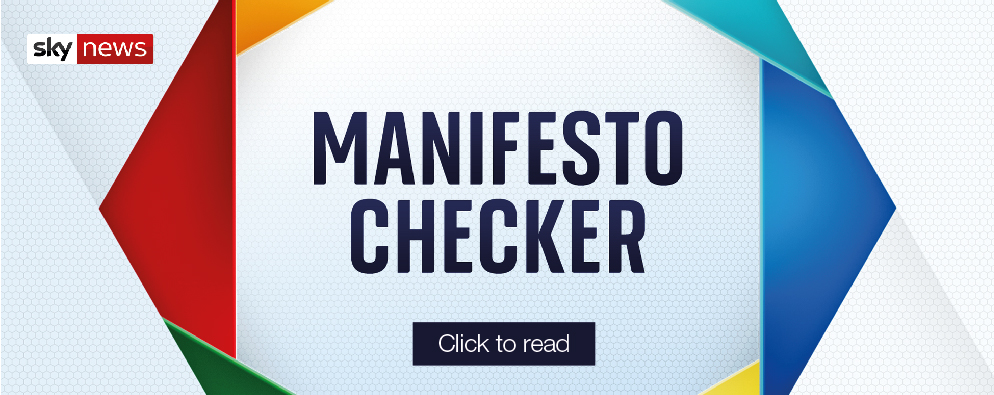
More than half of the world’s population, some four billion people, are participating in elections in 40 countries this year. Haggie Partners will be regularly tracking the key battleground issues in two of these contests: the US Presidential election on 7 November and the UK General Election which will take place on 4 July.
June 2024
Edition 4
Manifesto launches and the
hunt for economic growth
There are just 12 days until UK polling day and after all major parties declared their manifestos this week, Rishi’s Sunak’s decision to call a snap election on 4 July appears a blunder. Nationally recognised pollsters (there are one or two) are talking of the possibility of not just a big loss but a ‘wipeout’ and ‘electoral extinction’.
Election countdown
Conservatives
On Tuesday 11 June the Conservative party officially launched its 2024 election manifesto. Entitled ‘Clear plan, bold action, secure future’, the 80-page document sets out the party’s pitch for re-election, with headline pledges covering tax, support for families and immigration.
It sets out a package of tax cuts paid for by savings on tax avoidance and welfare spending. This supports their stance that “the only way to give people the peace of mind that government will be able to support them again when future shocks hit is to get borrowing and debt down”.
The giveaways – such as cuts to National Insurance contributions and the higher income tax personal allowance for pensioners – include £17 billion of tax cuts by 2029/30. The hoped for savings from tax avoidance are much less certain.
The tax cuts are promised by the end of the next parliament, despite the tax burden rising to record levels under their government, with savings of £18 billion via welfare reforms and tackling tax avoidance.
The Institute for Fiscal Studies (IFS) doubted the estimated gain from welfare reform and criticised the lack of detail about funding for public services.
Labour
Keir Starmer put economic growth and wealth creation at the heart of Labour’s offer to voters as he launched a business-friendly manifesto said to be targeted at former Conservative voters.
The manifesto promised not to raise corporation tax, to launch a new industrial strategy with clean energy at its centre, and enact rapid planning reforms to incentivise developers to build new infrastructure.
It pledges to raise £8 billion in tax derived from cracking down on tax avoidance and closing non-dom loopholes and aims to spend almost £5 billion a year on public services – another ‘trivial’ sum according to the IFS.
Aides argued the IFS assumptions are based on current growth forecasts, but the Labour plans on reforming planning rules, and setting up a state-backed green energy vehicle will change all that. “This growth will happen,” a spokesperson said.
Starmer set out rail nationalisation, 40,000 more NHS appointments each week, and free breakfast clubs in schools as core priorities while Labour’s green investment plan will now require £3.5 billion more in borrowing, according to PA on 13 June.
Reform
Reform UK’s ‘contract’ or manifesto offers several familiar themes including a freeze on non-essential immigration; deportation of foreign criminals; a halving of foreign aid; removing 20-mile-per-hour speed limits, withdrawing benefits from people who refuse two job offers, and leaning further into supposed ‘Brexit freedoms.’
They pledge far bigger, Truss-style tax cuts albeit with huge spending reductions at the same time as setting the bottom income tax threshold at £20,000. The IFS was critical: “Even with extremely optimistic assumptions about how much economic growth would increase, the sums in this manifesto do not add up.”
It is interesting though how Reform chooses to apply its pressure. They will be lucky to win more than a seat or two, but it is wise to consider how they are damaging the Conservative’s appeal by identifying red meat issues that attract Tories to Reform. Consider:
- scrapping Britain’s ambitious net-zero climate targets, central to its pitch at this year’s UK general election, in a bid to attract voters sceptical about the UK’s green transition
- roll back green targets, including the scrapping of net zero goals altogether, which would save £30 billion a year over 25 years
- net zero, costing taxpayers around £30 billion a year, has increased bills, damaged industries such as steelmaking, and made the UK less energy secure
- hold a referendum on the UK’s 2050 goal, a legally-binding target
Lib Dems
The Liberal Democrats and Ed Davey have revealed their election manifesto with a pitch to voters based on boosting the NHS and social care. They also claim that unlike those of Labour and the Tories their plans were fully costed.
As well as a series of green pledges, including an urgent programme of home insulation and retrofitting, and policies on the cost of living, such as a pledge on free school meals, the manifesto takes in traditional Lib Dem areas such as political reform and Europe.
The document also sets aside a planned average of £19.7 billion a year in capital investment, which does not sit within the costing’s calculation, including £6.2 billion for 150,000 new social homes a year, and £8.4 billion for green investment.
The Lib Dems say they would also reform aviation taxes on international flights, raising a planned £3.6 billion. They said families flying abroad one or twice a year would pay less, while those who travelled three times would pay about the same.
Insurance specifics
As Insurance Post commented, across all the manifestos there was little direct focus on the insurance industry with only Labour’s manifesto briefly addressing the general insurance industry, stating its ambition to “support drivers by tackling the soaring cost of car insurance”.
Aviva’s chief executive has said that Labour’s promised crackdown on rising motor insurance prices would be using a “sledgehammer to crack a nut” and was based on flawed logic.
Saying there was an issue with the market was “fundamentally flawed”, she told the Financial Times on 13 June. “You have to say this market is competitive,” she added. “[If there are] actors in this market who are maybe taking advantage . . . deal with that. You do not need a sledgehammer to crack a nut.”
Labour’s 80-page manifesto contained plans to invest £36 billion in local roads, rail and buses, with £8.3 billion set aside to fill potholes and resurface roads funded by the cancelling of the second phase of HS2. This is music to the ears of insurers, who informed Insurance Post that if politicians really want to reduce the cost of car insurance then a good place to start would be roads that increasingly look like rally tracks.
In addition to investment strategies, both major parties’ manifestos outline commitments towards achieving net-zero emissions. The Conservative party proposes policies such as trebling offshore wind capacity and building the first two carbon capture and storage clusters. Labour said it would commit £1 billion to accelerate the deployment of carbon capture and £500 million to support the manufacturing of green hydrogen.
Labour also outlined its commitment to phase out new internal combustion engine cars by 2030, a stance that contrasts with the Conservative party’s 2035 deadline. UK insurers will likely welcome policies in this area, as the industry has advocated for clearer governmental commitments towards net zero goals. Concerns have been raised within the industry regarding setbacks in climate targets.
Key battleground issues
Geo-politics
Cyber
Climate
Economy
Risk
Geo-politics

The prospect of a far-right government in Europe rattled European financial markets, following the announcement by President Macron that France is set to go to the polls. Macron called the high-risk national election after the far-right National Rally trounced his Renaissance party in the European election earlier this month. French far-right leader Marine Le Pen said she will not seek Macron’s resignation if her party triumphs in the snap parliamentary election set to begin later this month. Striking a presidential note: “I’m respectful of institutions; I do not call for institutional chaos,” Le Pen told Le Figaro.
On 14 June, South Africa’s Cyril Ramaphosa, leader of the ANC, was re-elected President of the first-ever South African coalition government. In India, Prime Minister Narendra Modi and his BJP party won the most seats in the general election on 4 June, but will need a coalition with the NDA to reach the seats required to form the next government.
G7 countries held a summit in Puglia, Italy, where Rishi Sunak concluded his first day without any formal bilateral meetings with any other G7 leaders but insisted he was not being snubbed. Sunak did however hold a 10-minute conversation with Ukraine’s President Volodymyr Zelenskyy. The G7 has agreed to use frozen Russian assets to raise $50 billion (£39 billion) for Ukraine to help it fight invading Russian forces. The Sun’s Harry Cole reported that insiders at the summit are worried about Joe Biden’s health. Cole quoted diplomatic sources who say the elderly president has been “losing focus” during meetings.
Cyber

Artificial intelligence and deepfakes have become a hot topic of conversation during this election year, after a fake ‘robocall’ was rolled out during the New Hampshire primaries in January appearing to be Joe Biden contacting voters and discouraging them from attending the polls. Similarly in the UK, the voices of Kier Starmer and Rishi Sunak were cloned to produce statements that warned there had been ‘multiple bomb threats’, advising voters to avoid attending the polls.
MI5 has released warnings to candidates, alerting them to the dangers these videos and audios pose in the spreading of misinformation. Ken McCallum, the director-general of MI5, warned that AI including deepfake technology could be weaponised by hostile states to sow confusion and disinformation during elections.
However, in other countries, AI is being embraced as a positive tool to sway voters. During the campaign prior to the election on 5 June, political parties in India supposedly spent an estimated US$50 million on authorised AI-generated content. This content was used for targeted communication and to bolster party messaging with their constituencies, with reportedly successful results.
Climate

G7 leaders called for richer developing countries to pay for climate change, after UN negotiations failed to make progress on a new funding target to help poorer nations deal with global warming. The move by the leaders of the richest countries of the world on 14 June will put them at odds with countries including China, Saudi Arabia and India, who argue developed nations should have to pay for the effects of historical emissions.
Shell’s chief executive officer used a trip to Washington to deliver a plea for stability months before a US presidential election that threatens more upheaval in the global energy sector. Wael Sawan’s remarks during his two-day visit to the US capital come as the oil major reorients its strategy for navigating the energy transition amid investor pressure to focus on its prime petroleum business. Sawan said: “There is nothing more important than stability and predictability”.
Economy

US inflation fell to just 3.3% in May in a boost to financial markets and analysts anticipate an interest cut before the November poll. In the UK, on 19 June inflation fell to 2%. This will be seized on by the Conservatives as a significant achievement given 2% is the official Bank of England target for inflation. This is the lowest it’s been since July 2021, and way down from the peak of 11.1% in October 2022. On 20 June, the Bank of England held interest rates at 5.25%.
Pre-election attention has also been focused on the state of national debt. Proposed Conservative tax cuts, worth £17 billion, including further reductions to employee national insurance, will increase the tax burden, now forecast to hit 36.8% by 2028/9. Labour would increase the tax burden to its highest level on record. It announced some £8.6 billion of additional tax, taking tax as a share of GDP to 37.4%.
Ofgem announced another reduction in the energy price cap from July. The new cap on the unit price of energy should see costs fall by another 7%, taking £122 off the average household bill. And it didn’t take long for both the Tories and Labour to try to swing the news in their electoral favour.
London was the main drag to UK productivity growth between 2019 and 2022, a trend that pushed the efficiency gap between the capital and the rest of the country to its lowest level on record. The Financial Times reported on 18 June that output per hour worked fell 2.7% in London between 2019 and 2022, in contrast with a 2.5% expansion across the UK over the four years, the Office for National Statistics said.
Risk

As the US prepares to vote in November, risk analysts are tackling the increased rise of political instability for fund managers. “The US is currently more divided ideologically and politically than at any time since the 1850s, when tensions boiled over into civil war,” said Nigel Green, CEO of deVere Group, the international wealth management firm. Green added: ‘This deep division, combined with the potential for significant civil unrest, creates a highly volatile environment for investors in the world’s largest economy.”
Polls
The latest YouGov voting intention survey, conducted on 12-13 June, has Reform UK just one point ahead of the Conservatives on 19% to 18%, which is within the margin of error. Perhaps this isn’t statistically significant, but it provides compelling headline articles for Reform.
Nigel Farage, ever the great self-publicist, was quick to declare himself the new leader of the opposition. We will not be able to tell for some time whether Reform can sustain or even improve its position relative to the Conservatives. Elsewhere, Labour is on 37%, down one point from the previous poll, while the Liberal Democrats – who saw a four-point boost in YouGov’s previous poll by a single point, to 14%.
The Greens are likewise down one point to 7%. Professor John Curtice of Strathclyde University has said that there would appear to be evidence suggesting Labour’s support slipping across demographics, though this was admittedly from a high polling point.
In the US, the polls remain steady with former President Donald Trump leading President Biden by a point. The figures do not appear to have changed to a meaningful extent for some months, but The Economist’s model of the election—which relies solely on polls, past results and economic data—gives Biden a one-in-three chance of re-election. Swing state voters and undecideds will edge closer to a decision following the first televised debate on 27 June.
19 June 2024 from The Economist
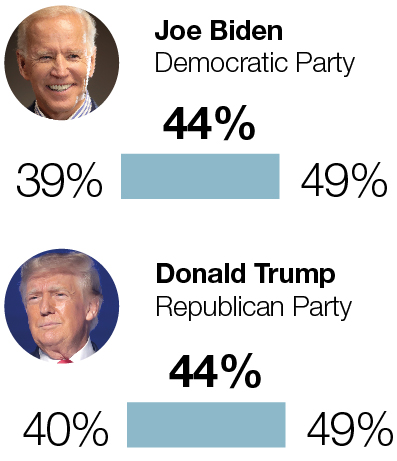
17 June 2024 from BBC News
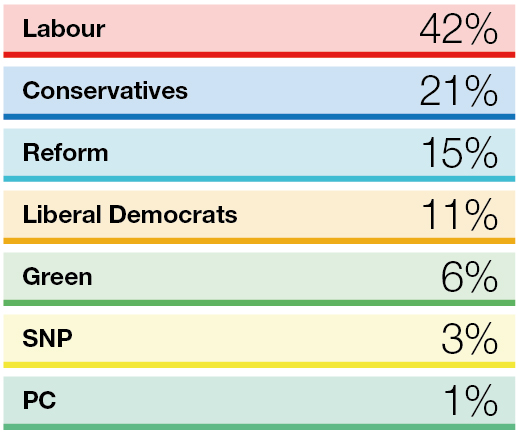
Manifesto watch
Click on the links to read the latest manifesto related information
Trump’s vice-presidential shortlisting continues
The Trump 2024 campaign is said to be nearing completion of its rounds of vetting suitable vice-presidential candidates. This is always a matter of applying the right candidate to the electoral issues of the time. We discussed the importance of regaining the women’s vote in an earlier edition. This time it’s finding a candidate who can appeal to Hispanic voters or black voters. Or, in a nod to Trump’s likely presidential in-tray, a foreign affairs specialist. Here are three names circulating in discussions about his vice president shortlist:
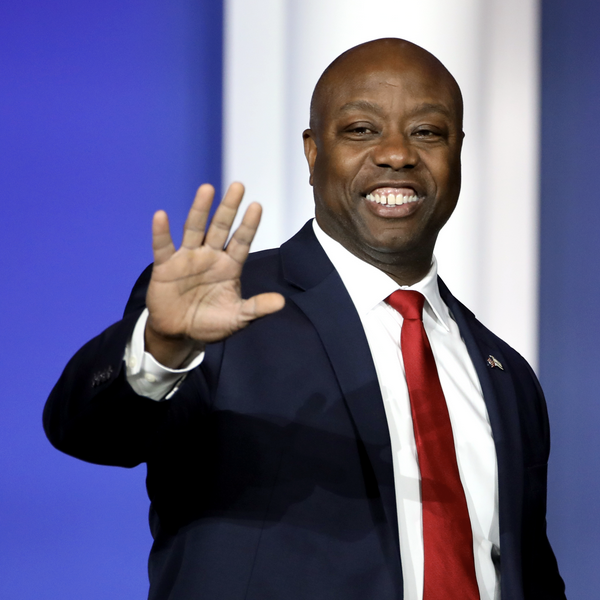
Tim Scott
Trump’s shortlist is said to include former 2024 competitor and black evangelical Tim Scott who could help the Trump campaign make inroads into more diverse pools of voters. He is the only black person ever to serve in both houses of Congress, and his ‘up by the bootstraps’ life story complements Trump’s billionaire credentials.
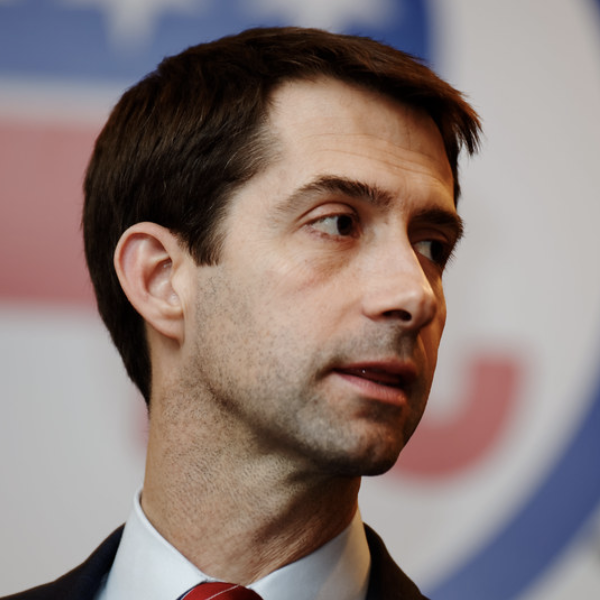
Tom Cotton
Mentioned as a prospective CIA director during Trump’s first term, those familiar with their relationship say that as president, Trump turned to the senator for advice on foreign affairs. Republicans believe that Cotton is somewhat pedestrian on TV, and he could be in the mix for another job such as secretary of state or secretary of defence.
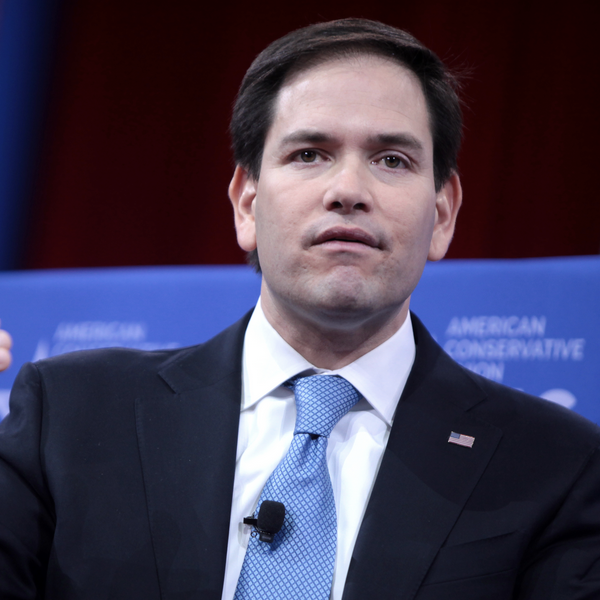
Marco Rubio
The three-term senator who Trump famously mocked as “Little Marco”. Rubio, who ran for President against Trump in 2016, bridges the old school GOP Reaganite and the new Trump MAGA. A son of Cuban immigrants, Rubio would also give Trump fluency in foreign policy and Spanish – a prized asset on the trail as Trump woos Hispanic voters.
Social media watch
Distorting the online conversation
The Conservatives have been warning voters online that Labour could win with a landslide in the 4 July UK general election. Conservative social media advertisements have been urging people against voting for the Liberal Democrats and Reform UK, warning that backing those smaller parties could give Starmer a “massive majority”. Another said voting Lib Dem or Reform would ‘hand Keir Starmer a blank cheque’. The Conservatives have launched approximately 40 new Facebook and Instagram ads focusing on a Labour landslide. These contrast with previous Tory ads that issued warnings such as ‘vote Reform, get Keir Starmer’.
Assiduous social media readers will be familiar with ‘Vote Reform UK’, and ‘Only Reform UK has a real plan for Britain’. This is from an account on X that has posted similar messages every couple of hours since the start of the election campaign. The account, GenZBloomer, is one of dozens across X, Instagram, Facebook and TikTok identified as posting hundreds of repeated messages in comment threads expressing support for Reform UK. Their behaviour has prompted claims from across social media that they are fake or ‘bot’ accounts. and they are distorting the online conversation to try to exaggerate the popularity of Reform UK.
The race for online audiences
Sky News monitored the performance of the parties across X to gauge the race for online audiences. Using the social media monitoring tool SocialBlade, Sky News tracked the number of followers each party’s account gained on X during the first half of the campaign.
Over the past 30 days, Reform UK experienced the largest increase, gaining more than 11,000 new followers. The Labour Party followed closely, adding 9,366 followers. The Conservative Party saw a more modest increase of 4,379 followers. The SNP had the least growth, with only 159 new followers during this period.
Despite Reform UK’s strong performance, the overall follower landscape remained relatively unchanged. Labour leads with just over 1,020,000 followers, followed by the Conservative Party with 623,731.
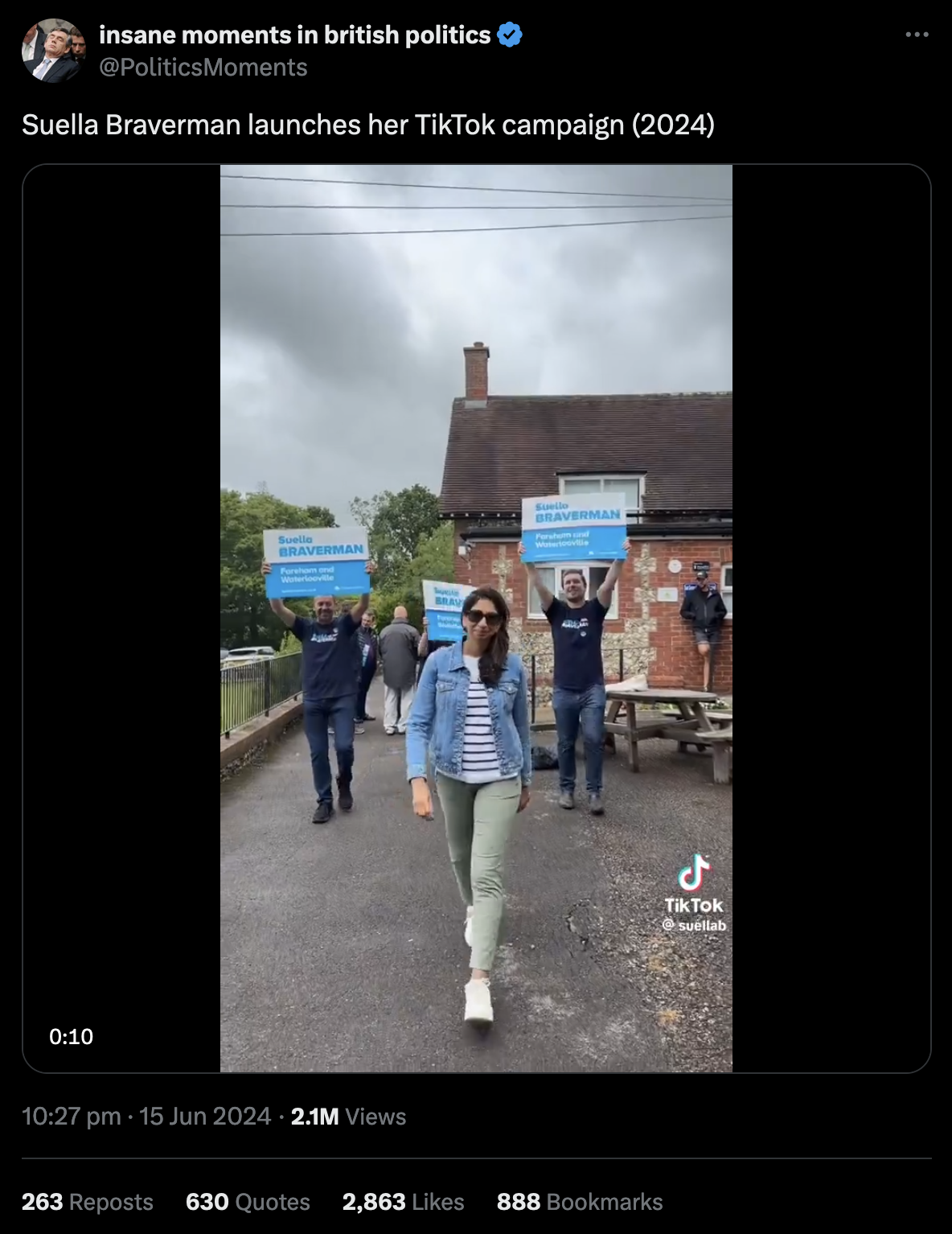
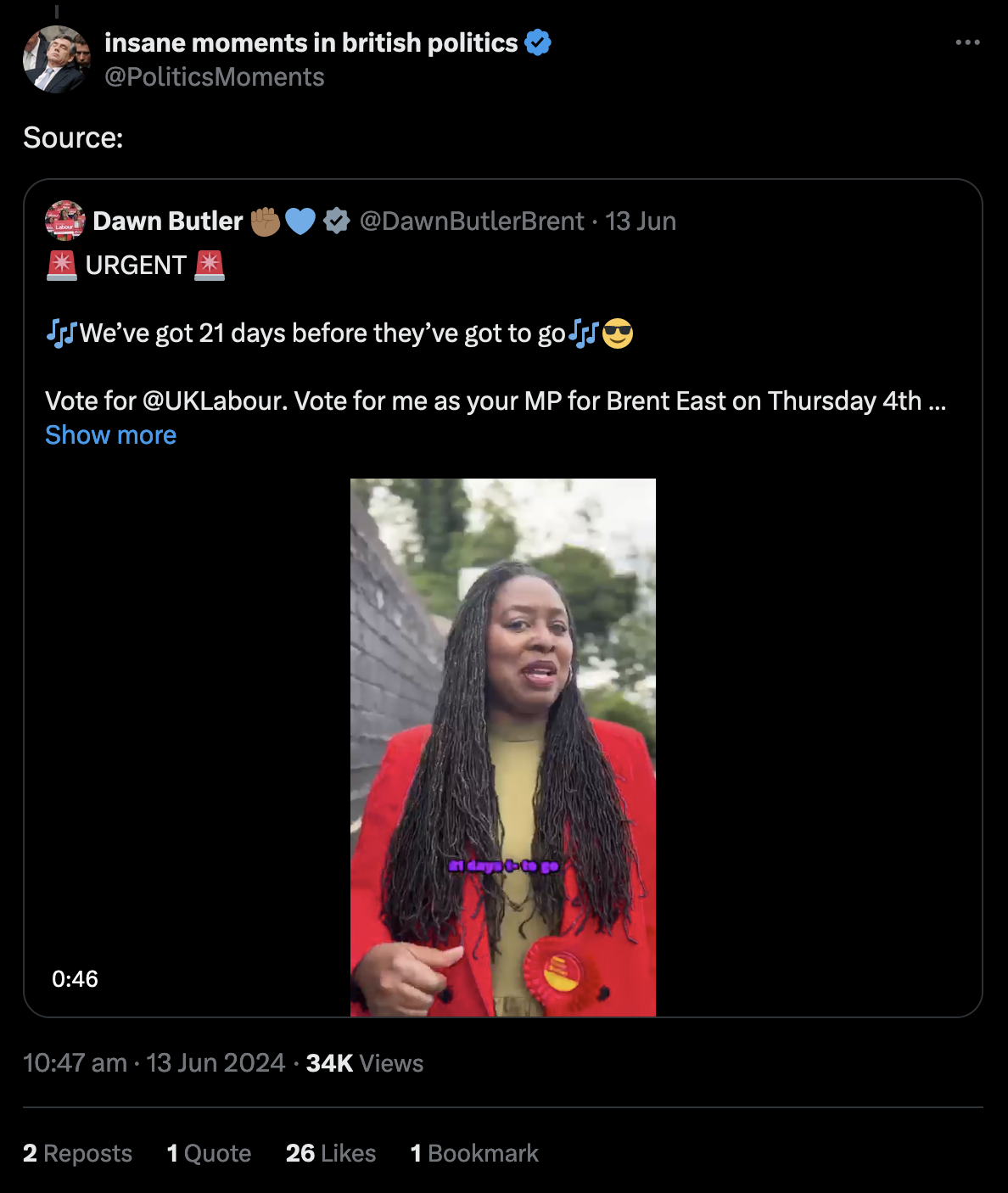
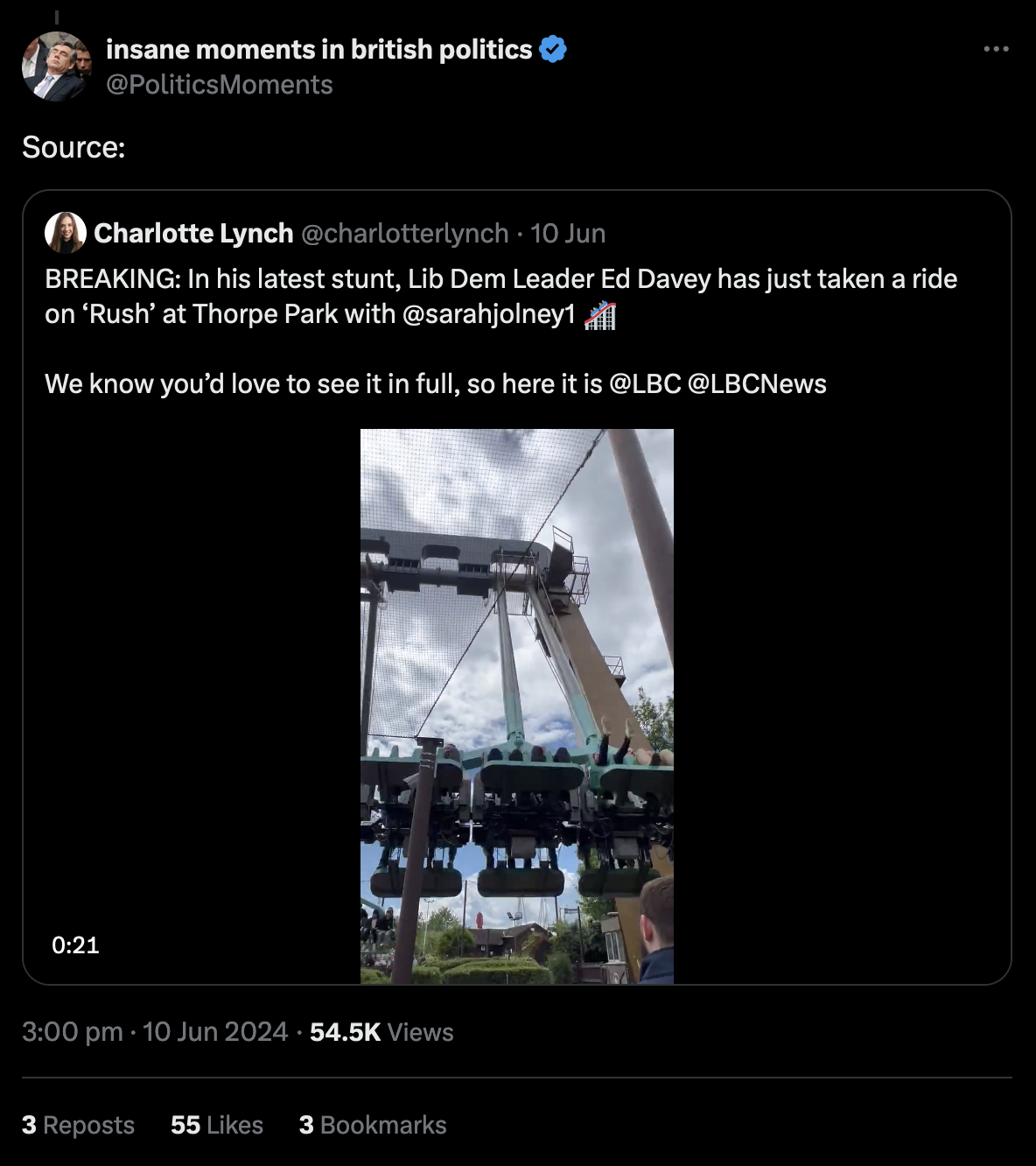


Election campaign watch
27 June: The first Presidential debate
15 July: The Republican National Convention
19 August: The Democratic National Convention
10 September: The second Presidential debate
5 November: Election Day
6 January 2025: Results certification
20 January 2025: Inauguration
4 July: Polling stations are usually open from 7am until 10pm on the day.
5 July: The exact number of seats for each party will not be clear until the early hours of Friday 5 July.
9 July: Parliament returns.
17 July: The King’s Speech.
September: The new government’s first budget (or fiscal event).
Get in touch
Cressida.Tarver@haggie.co.uk


